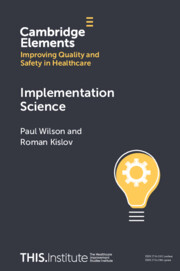
-
Select format
-
- Publisher:
- Cambridge University Press
- Publication date:
- 13 October 2022
- 24 November 2022
- ISBN:
- 9781009237055
- 9781009237086
- Creative Commons:
-
This content is Open Access and distributed under the terms of the Creative Commons Attribution licence CC-BY-NC-ND 4.0.
https://creativecommons.org/creativelicenses - Dimensions:
- Weight & Pages:
- Dimensions:
- (229 x 152 mm)
- Weight & Pages:
- 0.106kg, 56 Pages
- Subjects:
- Medicine: General Interest, Medicine
- Series:
- Elements of Improving Quality and Safety in Healthcare
Open AccessYou have digital access to this book- Subjects:
- Medicine: General Interest, Medicine
- Series:
- Elements of Improving Quality and Safety in Healthcare
Book description
This Element introduces and critically reflects on the contribution of implementation science to healthcare improvement efforts. Grounded in several disciplines, implementation science is the study of strategies to promote the uptake of evidence-based interventions into healthcare practice and policy. The field's focus is threefold. First, it encompasses theory and empirical research focused on exploring, identifying, and understanding the systems, behaviours, and practices that influence successful implementation. Second, it examines the evaluation of strategies to address barriers or enablers to implementation in a given context. Last, it increasingly seeks to understand the process of implementation itself: what actually gets implemented, and when, why, and how? Despite the growing body of evidence, challenges remain. Many important messages remain buried in the literature, and their impact on implementation efforts in routine practice may be limited. The challenge is not just to get evidence into practice, but also to get implementation science into practice. This title is also available as Open Access on Cambridge Core.
References
Metrics
Altmetric attention score
Full text views
Full text views help Loading metrics...
Loading metrics...
* Views captured on Cambridge Core between #date#. This data will be updated every 24 hours.
Usage data cannot currently be displayed.
Accessibility standard: Unknown
Why this information is here
This section outlines the accessibility features of this content - including support for screen readers, full keyboard navigation and high-contrast display options. This may not be relevant for you.
Accessibility Information
Accessibility compliance for the PDF of this book is currently unknown and may be updated in the future.


